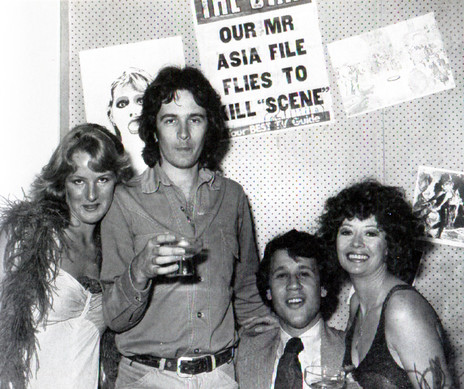
Colin Hogg, standing, being visited in the Auckland Star office by Radio Hauraki host Alan Beagle and two commercial radio employees, early 1980s. - Colin Hogg collection
Things were beginning to get more interesting on the local live music front by 1980. There was more going on, new names rising, new sounds. After Bob Marley and the Wailers at Western Springs and the Members at Mainstreet, reggae and punk were being channelled into our own versions. It was beginning to get a bit exciting.
Split Enz, with Lip Service, Auckland Town Hall, 15 February 1980, Auckland Star
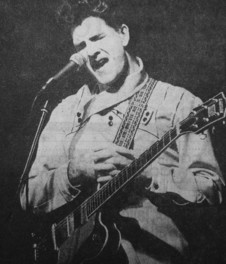
Tim Finn with Split Enz, 1980. - Colin Hogg collection
New Zealand’s beloved Split Enz showed their True Colours with more than a touch of Frenzy at the Town Hall last Friday.
They’re on tour to celebrate the release of a new album True Colours – and it’s an album well worth celebrating.
It got a good airing, as did last year’s Frenzy, but there wasn’t much more than a touch of older material to add an edge of the old Enz flavour.
It’s a very new Split Enz we’re seeing these days. The move away from the onstage madness of old is gradual but in strong evidence now. Even the stage clothes have been toned down, though guitar star Neil Finn cut a dashing figure onstage in his purple tights, topped off with yellow shorts.
The music is now very definitely the thing, and the band was playing with real purpose on Friday.
Kicking off with the instrumental ‘Double Happy’, they powered through a cross-section that favoured new material over old and rockers over ballads.
At times battling a moody sound system, singer Tim Finn and his merry band gave us highlights like ‘I Got You’ – the new single with Neil on lead vocals – ‘Hermit McDermitt’, featuring some quite wonderful piano from the excellent Eddie Rayner, the evergreen ‘Charlie’, Tim’s beautiful new ballad ‘I Hope I Never’, ‘My Mistake’, with the audience actually singing the first verse, and an awesome ‘Give It a Whirl’.
Dragged back by an ecstatic crowd, percussionist Noel Crombie stole the spotlight, first with a touch of out-of-control guitar playing (it was plugged in, wasn’t it?) and then with his famous combined spoons solo and tap dance on ‘The Woman You Love’.
We all had a thoroughly splendid time. Try not to miss the next show. There just aren’t many opportunities like this.
Opening act Lip Service acquitted themselves very well with an impressive set of tight, aggressive and gutsy rock. What they lack in melody they almost compensate for with musical panache and attack. Just a shame their material isn’t a little more memorable.
Oh yes, everyone downstairs did stand up and jiggle about, though the people upstairs were very well behaved. And, no, the Town Hall hasn’t fallen down yet.
--
Sharon O’Neill and Jon Stevens, at the Town Hall, 10 March 1980, Auckland Star
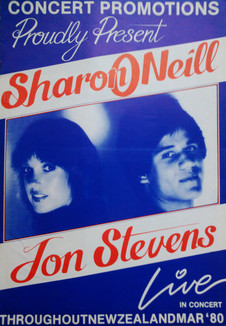
Sharon O'Neill and Jon Stevens tour, 1980. - Bob Smith collection
My ears must be failing me … But I swear I could hear people screaming at the Town Hall last night.
Gave me quite a turn. But, at the same time, I could have sworn Donny and Marie Osmond were on stage.
But no, fear not, ’twas just Sharon and Jon, as O’Neill and Stevens are known these days, bowing out after two hours of their songs – together and apart.
And what a tuneful little show it was, whether it was Stevens looking great and sounding better, or O’Neill, looking better still in front of her six-piece band or behind her piano, the show maintained a high melody quota throughout – and the almost-capacity audience loved it.
It was a decidedly democratic affair, with Stevens taking the first half, O’Neill the second, and the two duetting their way off stage.
Stevens opened his half strongly with his recent hit, ‘Montego Bay’. There’s no doubting he possesses a magnificent voice, but too often his material falls into a soupy mixture of ballads.
The strongest moments were the up-tempo ones, whether on ‘Montego Bay’, a rousing ‘Delta Lady’ or ‘Get Used to It’. But I shall never forgive him for the horribly funked-up version of ‘Ain’t No Sunshine’ he gave us last night and on his album.
But the girls loved him.
O’Neill, on the other hand, hardly put a step wrong. Spending most of the time out front instead of behind her piano, she soared through a strong selection from both her fine albums. The band sounded great, though they seemed to lose control of the rhythm on ‘Bitter the Heart’.
The highlight of her set came with her beautiful ‘Asian Paradise’, rendered more so by sensitive guitar and flute solos. And credit too, for the outstanding vocal harmonies provided by her two keyboardsmen.
With ‘Luck’s on Your Table’, Stevens joined O’Neill to squeals of delight from the audience.
Then, naturally, we got their ‘Don’t Let Love Go’ duet, Kenny Loggins’ ‘Whenever I Call You Friend’ and then, holding hands, one of those gloopy ‘May God Keep You’ songs the aforementioned Osmonds favour.
And that, apart from a brief reprise of ‘Don’t Let Love Go’ – which passed for an encore – was it.
Makes you proud to be a Kiwi.
--
The Crocodiles, with The Ray, Windsor Park, April 1980, Auckland Star
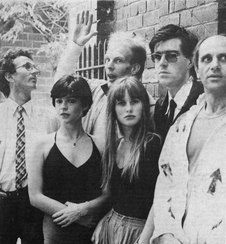
The Crocodiles Mk.1: Tony Backhouse, Jenny Morris, Fane Flaws, Tina Matthews, Peter Dasent and Bruno Lawrence, 1979
Low-key to lacklustre seemed a fair description for the performance proffered by the six-piece Crocodiles in deepest Mairangi Bay at the weekend.
For a band tipped as the hot new act in town, The Crocodiles played to the dull side of average with their set of 60s-styled pop songs.
Jenny Morris (lead vocals/hot pants) has a fine line in vocal scorch, but with the rest of the band lagging well down the energy meter, it sounded like an uphill battle.
Aiming at a territory that falls vaguely between the B52s and ABBA, they peddle a nice line in teen angst with ‘First Date’ and ‘In My Car’ really kicked things along. But with covers like ‘You Can’t Hurry Love’ and ‘Denise’ and their own brand of harmony-heavy pop, the feel was too often an echo of, rather than a progression on the 60s sound the Crocs seem so fond of.
Add to that a visual approach that blended Casablanca with Debbie Harry and a drummer who looked and sounded like he gave up long ago and I begin to wonder what all the excitement is about.
Opening band the Ray, on the other hand, were never less than interesting. Maybe they were a little indulgent with their eclectic blend of jazz and new wave (heavier on the latter), but it was only their second gig.
And, with their taut little melodies stretched over a rhythm section that veered between thinking man’s metronome and deliberate lunacy, they’ve got a pretty impressive skeleton there to flesh out.
--
Midge Marsden’s Kiwi Connection, featuring Sonny Day, at the Gluepot, last night and until Saturday, April 1980, Auckland Star
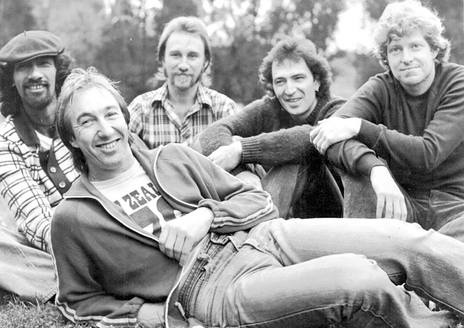
From the Kiwi Connection tour circa 1979. From left - Sonny Day, Ray Chaber, Sidney Limbert, Bruce Dennis, and Midge Marsden. - Sidney Limbert collection
I’d like to have said they were amiable but ragged.
But, my God, they were so ragged their bones were showing for most of last night’s set. Which is all the more surprising when you realise Kiwi Connection is at the end of a six-week national tour.
Midge Marsden, whose last musical job was a stint with Australia’s Phil Manning Band, is still peddling his favourite musical form – the blues. And, with his harmonica stuck in the midst of his ever-present grin, he certainly has a nice line in affectionate sloppiness.
And some of the songs – in particular a very muscular ‘Over Yonders Wall’ complete with searing slide guitar – sounded great. But the majority, including a very shaky and overblown reggae run-through of Dylan’s ‘Knockin’ On Heaven’s Door’, was just messy.
And although I could almost come to terms with Sonny Day’s impassioned overkill approach to his turns at the mic, someone should have the couth to rip that electric guitar out of his hands, or that very least confine him to mere rhythmic back-up. His stabs at soloing sounded clumsy and often painful.
Maybe with a bigger crowd and lot more beer the Kiwi Connection will sound better, but I’m not convinced. And, without that tough, supple rhythm section, they’d really be out in the musical cold.
--
Spelling Mistakes, at the Gluepot, last night and tonight, April 1980, Auckland Star
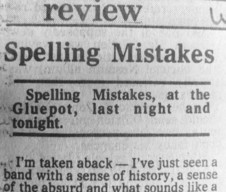
Spelling Mistakes at the Gluepot.
I’m taken aback – I’ve just seen a band with a sense of history, a sense of the absurd and what sounds like a healthy dollars and cents future.
Spelling Mistakes are young, ragged, mostly loud and mainly great.
First, the sense of history.
Well, they actually sound like they’ve raided their big brothers’ record collections. Why else would their sense of rock and roll be so full of pre-76 influences?
I mean to say, you could almost claim they have a grasp of what rock and roll dynamics are all about.
Their songs are full of great beefy guitar chords, out-of-control Chuck Berry-esque rip-off solos and stops, starts and fumbles that actually work for them rather than against.
In fact, they’re the sort of band you should catch now. I’m not sure they’ll be quite so much fun when they play entirely together and constantly in tune.
And lead singer Nick Hanson, who has the dress sense of a grease monkey and the dancing sense of a lunatic, will probably be an old man by this time next week, the rate he’s going.
And, as for the sense of the absurd … any band that plays ‘Wipe Out’ as deliberately badly as Spelling Mistakes did last night has to have more going for it than mere bad taste.
Get up and see them. People were actually clapping last night – and the band can’t have that many brothers and sisters.
--
Mi-Sex, with The Swingers, at the Logan Campbell Centre, Saturday and last night, June 1980, Auckland Star
It’s no wonder Mi-Sex express reluctance about touring Britain – on the evidence of Saturday night’s show, they might have problems.
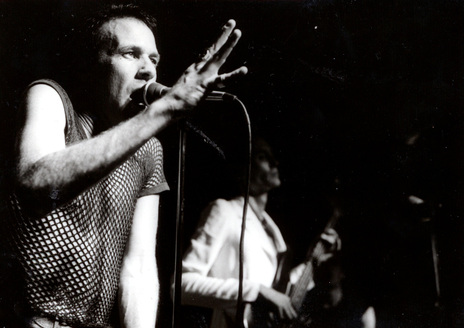
Steve Gilpin, Mi-Sex. - Photo by Murray Cammick
Any band that props up its (occasionally catchy I grant you) rock/disco variations in the concert hall with mere volume, aided and abetted by the in-person ego of singer Steve Gilpin, whose only concession to stage presence is to pogo mindlessly or pseudo-strangle his hapless guitarist, and a bassist who looks like a space-age hippie, bare feet et al, wouldn’t have a future that stretches far round the corner.
Slick, loud, repetitive, musically hollow-centred – and the packed crowd loved them.
The show had a very shaky start, with the hapless punters locked out until after the advertised concert starting time, then having to endure a potentially dangerous human whirlpool to get through the gates to their seats.
A $10 ticket should buy better than that.
Opening act The Swingers had their problems too, with bassist Bones Hillman suffering various technical hitches.
But they got their act together and played a very sharp and snappy set of their own peculiar brand of heavy metal pop.
Then on came the heroes of the hour. Opening with a powerful ‘Graffiti Crimes’, Mi-Sex kept things tight and to the point, never straying far from the studio originals.
They played powerfully but certainly didn’t give anything away, though Murray Burns dominated the instrumental spotlight consistently from behind his battery of keyboards.
The best moment came with the only relatively low-key song, the excellent ‘It Only Hurts When I’m Laughing’, though naturally ‘Computer Games’ – taken at breakneck speed – and ‘People’ got the loudest roars of approval.
My biggest surprises were the surprisingly less-than-spot-on lighting and Gilpin’s ridiculous quasi-dramatic intros and outros to every song.
Then he capped it all off with boast of: “We’ve probably sold more records than this country has sheep.”
Ewe must be kidding, mate.
--
The Pink Flamingos, at Jilly’s, last night and Wednesday to Saturday for a season, August 1980, Auckland Star
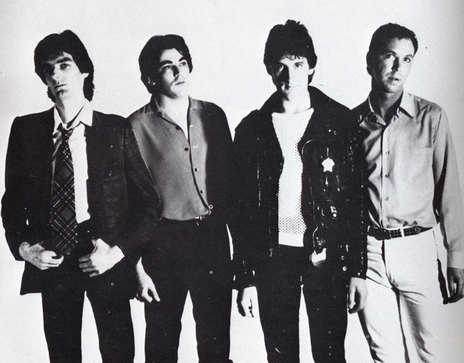
The Pink Flamingos, 1981. Left to right: Paul Hewson, Paul Woolright, Dave McArtney, Jim Lawrie
Thank you for last night, Sharon O’Neill. I am sorry you were ill and had to cancel your concert at Mainstreet Cabaret.
But it was thanks to you that I dropped into Jilly’s last night and – as it turned out – gave the disappointed ears a real treat.
Because, gracing the stage at the central city cabaret under the unlikely name of the Pink Flamingos, were four gents who – if name and experience count for anything – deserve that much-abused title, supergroup.
Paul Hewson (ex-Dragon) plays piano, Dave McArtney (ex-Hello Sailor) plays guitar, Paul Woolwright (ex-Ticket) plays bass and filling in on drums was Jim Lawrie (Street Talk).
But “names” aside, Pink Flamingos is a band bursting at the seams with cold hard talent.
Kicking off with Hewson’s own ‘If I Could Climb a Mountain’ – featuring his masterly piano and Leon Russell-tinged vocals – and the band strode through a clutch of songs that managed to straddle country rock, a Lou Rawls standard, blues – with an energetic ‘Dust My Broom’ – rock and ballads.
Do yourself a real favour – catch the Pink Flamingos before they fly north.
--
Sharon O’Neill, with Kevin Borich, at Mainstreet Cabaret, 20-23 August 1980, Auckland Star
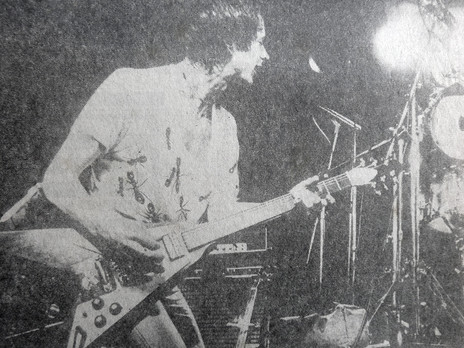
Kevin Borich at Mainstreet Cabaret, 1980. - Colin Hogg collection
We were promised a night of rock and roll – and that’s what we got.
From Kevin Borich and band, the last of the power rock trios, it wasn’t surprising – and, as it turned out, it bordered on great – but from Sharon O’Neill, singer/songwriter and record star with an appeal as wide as your arms can spread, it was a bit more of a surprise.
But rock she certainly did – or to be more accurate, her band did. And that, for my ears anyway, was the problem.
But let’s deal with Borich first – and he certainly dealt with us. Hard, blues-based rock – by Hendrix, out of the Rolling Stones – is what Borich and his rhythm section are all about.
Dated they may be, but they do what they do so well, so convincingly, so powerfully, it’s hard to argue.
Add to that a great sound system and a guitarist that Carlos Santana has been more than honoured to share a stage with, and no one’s about to complain.
And, speaking of great bands, Sharon has one too. In fact, maybe the problem was that it was just too powerful.
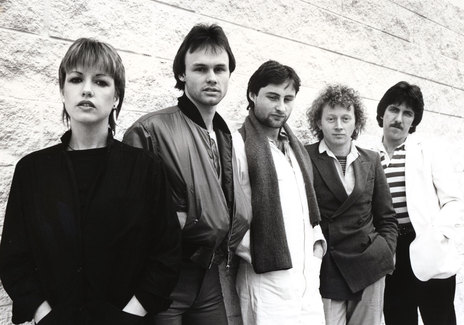
The 1980 Sharon O'Neill touring band (L-R): Sharon, Brent Thomas, Steve Garden, Dave Dobbyn, Clinton Brown.
Rock and roll was never really what her best moments were all about. Songs like ‘Bitter the Heart’ and ‘Asian Paradise’ have been left behind for a harder, rockier approach that too often left her floating like a butterfly over a backing that didn’t so much provide gentle updrafts but anti-aircraft fire.
Brent Thomas and Dave Dobbyn supplied loads of attack on the guitar frontline for old favourites like ‘Words’ and ‘Baby Don’t Fight’, but too many of O’Neill’s new songs aired last night were tailored to a hard-ock approach that is not what she’s really about.
Oddly, one of the set’s high points went to Dobbyn himself with ‘Be Mine Tonight’, from his days with Th’ Dudes.
O’Neill’s forte – the softer, gentler heart-tugger – was sadly trodden underfoot last night, or merely forgotten.
--
Street Talk, with Ray-A Band, at the Gluepot, 6 September 1980, Auckland Star
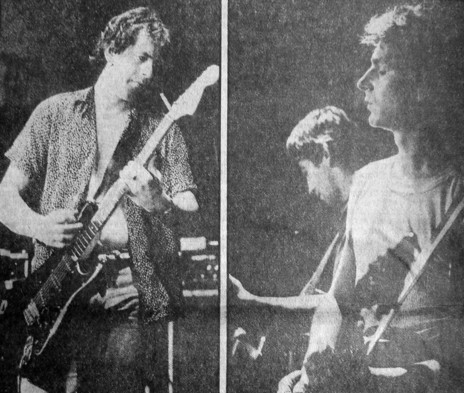
Street Talk's final gig, 6 September 1980 (L-R): Hammond Gamble, Andy MacDonald and Mike Caen. - Colin Hogg collection
“I’m gonna leave here running/ Walking is much too slow,” Hammond Gamble growled into the mic during the first song of Street Talk’s last-ever gig, on Saturday night.
And that’s about the way it went.
There was a capacity crowd outside The Gluepot at 6.25 on Saturday evening, all eager to send off a band that’s probably played more gigs in that pub than any other in the band’s six and a-half-year history.
And even Radio Hauraki got in on the action with a live-to-air broadcast of Street Talk’s last 90 minutes of life.
But first up were Ray-A Band who took to the stage at 7.15 with a set of unashamedly quirky original songs, kicking off with the eerie Pink Floyd-ish ‘Dreamtime in Australia’.
Despite the fact that they were stylistically totally at odds with Street Talk’s brand of blues and rock, Ray-A have far too much going for them to be relegated to support status for long.
Plenty of really strong, eccentric songs and a fine feel for the simple complexities of reggae.
Then it was over to Street Talk, first for a half-hour warm-up – of blues, what else? – which saw guitarist Mike Caen blow his amp, leaving the band to handle ‘Nobody Knows You When You’re Down and Out’ and ‘Ramblin’ On My Mind’ as a four-piece, giving Stuart Pearce space to insert some typically tasty piano into the latter.
Fully amped up, with only minutes to spare, the band finally took to the air for an unbroken 90 minutes – if you discount Gamble’s crazed yowls of “Yessirreee” at frequent intervals.
‘Lonely at the Top’, ‘Lazy Pauline’, ‘China Girl’, ‘Trouble’, ‘Feminine Minds’, ‘She’s Done it Again’ and ‘Leaving the Country’, the cream of the band’s original songs, were kicked over the heads of the packed crowd, high on a mixture of nostalgia, heat, draught Diploma and some of the best music the Gluepot’s ever rattled its windows to.
A superb band, as they proceeded to demonstrate with an emotive 12-minute-plus performance of an old blues warhorse from their past, ‘A Million Miles Away’ – Pearce, bassist Andy MacDonald and drummer Jim Lawrie taking solos, then stepping back to let Gamble and Caen’s guitars fight their last duel.
As someone said of Street Talk recently, “Simply, the best New Zealand rock and blues band of the 70s”. Shame it couldn’t be for the 80s as well.
But we can confidently expect at least two new bands to rise from the ashes of Street Talk, with Gamble getting together a solo album and band for later in the year and Caen and MacDonald likely to front a new outfit.
The only lingering sore points: A record company that maybe didn’t care enough and radio stations that didn’t play enough.
--
The Spies, at Jilly’s, Sunday night, November 1980, Auckland Star
Not exactly a new band, but a new name and a musical approach to life radically different from the path the three members of The Spies [sic] were travelling a year or two ago.
Harvey Mann, Eddie Hansen and Glen Absolum certainly had trouble keeping their heads above water when the new wave hit them. Track records that included stints with some of the country’s former top bands and tastes for the high-flying end of the rock spectrum turned into real handicaps.
But all that’s changed. The Spies are floating into the new wave mainstream on a watertight raft of rock, reggae and tight, short songs high on melody and short of soloing.
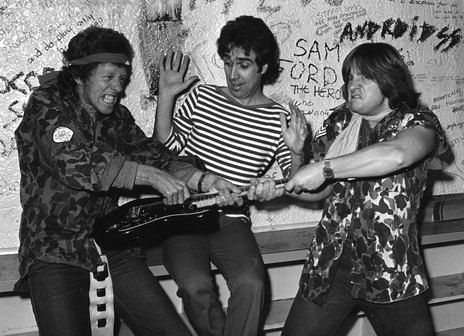
The Spys backstage at Auckland's Mainstreet, early 1981.
With a definite nod in the direction of The Police, Hansen and Mann are writing nifty, choppy pop songs with the emphasis on rhythm and their strong two-man vocal frontline.
The Police influence is strongest on songs like ‘Day in My Life’ and ‘Give Me a Reason’, a song that strips the reggae influence down to its bare bones.
Then there’s ‘Thieves in the Night’, a trace of heavy metal in both ‘Run Now’ and ‘Top Scientists’ and – best of all – ‘Generals of Darkness’, a song you stand a real danger of waking up singing the morning after.
A fine band. Catch them this week at Jilly’s, Wednesday to Saturday. And, God and Auckland’s small clutch of promoters willing, they might even make it onto the pub circuit.
--